DAVE'S DIARY - 12 JUNE2005 - JIMMY MARTIN OBITUARY
JIMMY MARTIN RIP AT 77
BORN
SNEEDVILLE, TENNESSEE - AUGUST 10, 1927.
DIED NASHVILLE, TENNESSEE - MAY 10, 2005.
LAID HIMSELF TO REST
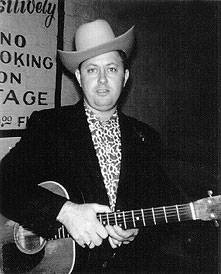 Jimmy Martin in 1958 |
When
rebel bluegrass king Jimmy Martin died of bladder cancer at 77 in
the Alive Hospice in Nashville he had long shared a snubbing with
Hank Williams. The
tombstone Martin erected for himself bears his photo and is topped
by the legend "Now Sings in Heaven." |
Martin was
thrilled to find a plot near Country Music Hall of Fame legend Roy Acuff
and delighted in the notion the ''King of Country'' and the ''King of
Bluegrass'' would rest in eternal proximity.
So he borrowed the text of the Hall of Honour plaque for use on his own
gravestone.
That way he sidestepped the Grand Ole Opry who shunned him despite being
subject of a book called True Adventures With The King of Bluegrass
and the George Goehl documentary 2003 DVD - King of Bluegrass: The
Life and Times of Jimmy Martin.
Martin sometimes cried when he spoke of being left off the Opry roster,
which he equated with the loneliness he felt after his father died.
''Ever since I was a little boy, I've felt left out of things,'' he told
The Tennessean several years ago.
That was despite writing and recording the celebratory Grand Ole Opry
Song - a number he believed would be a ticket to Opry membership.
"I think Jimmy is his own worst enemy," his former banjo player
J.D. Crowe once said of the singer who continued performing in 2004.
"He's made a lot of mistakes, and he's alienated a lot of people
- people who could have helped him had he let them."
FROM
SNEEDVILLE TO NASHVILLE
| Martin
was born in Sneedville, a farming community in Tennessee's eastern
hills. Jimmy's father died when he was four and he spent much of his childhood ploughing corn. He hunted and sold possum skins in order to buy his first guitar at the age of 10. On Saturday nights he listened to Roy Acuff, Bill Monroe and others on Grand Ole Opry radio broadcasts from Nashville. Martin dropped out of school in the eighth grade. |
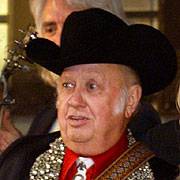 |
He did not
get along well with his stepfather and with many co-workers once he left
home.
He was fired from several jobs for singing while working.
In the Goehl
film, King of Bluegrass: The Life & Times of Jimmy Martin,
the singer said his first guitar consisted of rubber bands stretched across
a flat tin Prince Albert tobacco can.
Later, he learned basic guitar chords from a neighbour.
Martin played occasionally on radio stations in Knoxville and Morristown,
Tennessee, in the late 1940s before heading to Nashville in 1949.
BILL
MONROE AUDITION
He ensured an audition for Bill Monroe's band in his own forthright way.
The singer headed backstage at the Grand Ole Opry and confronted Monroe
who agreed to sing a dressing room duet.
Monroe was impressed by Jimmy's pure voice and guitar playing, and, in
1949, hired him - Martin replaced Mac Wiseman.
The two stayed together until 1954, playing on 46 recordings with their
notable duets.
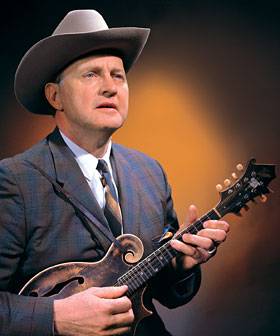 Bill Monroe |
''Jimmy's
strong, high vocal range pushed Monroe's tenor up into the sky,
helping shape what has become known as the 'high lonesome sound,'
'' Goehl wrote in the liner notes to Don't Cry To Me, a compilation
that accompanied his King of Bluegrass documentary. ''Bill
Monroe was his idol and someone he patterned himself after musically.'' |
He later
claimed to have assisted Monroe in the writing of Uncle Pen, Memories
of Mother And Dad and others.
Martin left Monroe in 1951 and returned for another stint beginning in
1952.
MONROE BATTLES
Martin revealed
his falling out with his former employer to the late Bill Monroe's biographer
Richard Smith.
"Me and Bill Monroe, I would say, were as close as any two musicians
have ever been when I was a Blue Grass Boy," Martin confessed.
"But when I went out on my own and my records started getting up
on the charts, he started to ignore me and wouldn't even talk to me. It
seemed like the more popular I was, the less he cared for me."
Two years later he entered a Nashville studio with a group including Bobby
and Sonny Osborne (later of Rocky Top fame) and recorded six songs for
RCA Victor, including the influential 20-20 Vision.
That group was short-lived but Mr. Martin's solo career was just beginning.
He recruited brilliant players Paul Williams, Bill Emerson and J.D. Crowe
for his Sunny Mountain Boys.
Other members included famed songwriter Paul Craft (who got his start
playing banjo with Jimmy), Doyle Lawson, Vernon Derrick, Audie Blaylock
and many more.
Martin recorded classics Ocean of Diamonds, Saphronie, My Walking Shoes,
Sunny Side of the Mountain, Widow Maker, (I've Got My) Future On Ice and
Milwaukee, Here I Come.
His originals included All the Good Times Have Passed, Don't Cry to
Me, Hit Parade of Love, Hold Whatcha Got and Tennessee.
Martin and his energetic band performed as members of the Louisiana Hayride
from 1957 to 1959 and of the Wheeling Jamboree in West Virginia from 1959
to 1962.
''In his heyday, he could take an audience of any size and have them eating
out of his hand,'' said Sunny Mountain Boy Emerson.
''He'd just smoke those people, and they'd be waiting in line for him
when he got offstage.''
In 1958 Martin began an 18-year career with Decca (later MCA) Records.
He charted that year with Rock Hearts, which went to #14.
It was the highest position he ever reached on the charts although he
made the Top 20 in 1964 with his trucker anthem, Widow Maker.
NITTY GRITTY DIRT BAND
Martin expanded
beyond country and bluegrass in 1972 when the Nitty Gritty Dirt Band invited
him to join them in recording Will the Circle Be Unbroken - a triple
album of traditional tunes with such country music luminaries as Mother
Maybelle Carter, Merle Travis, Roy Acuff, Earl Scruggs and Doc Watson.
The album yielded Martin his last chart single, Grand Ole Opry Song, which
peaked at #97 in 1973.
| His
was the first voice heard on the first NGDB disc and sang on the subsequent
two volumes as well. His appearances brought his voice and feisty spirit to audiences that may have never attended a bluegrass festival. ''Jimmy's temperature is higher than the rest of ours,'' said Dirt Band member Jeff Hanna in a 2002 interview. ''He's a wild man in the best sense of the term, and he's the only one who brought the fire of rockabilly music to bluegrass.'' Even when he was a guest he offered direction with an incorrigible insistence. "Pick the banjo solid," he instructed the band's John McEuen as he prepared to kick off a Martin classic. |
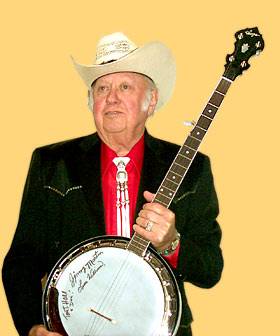 Jimmy Martin |
"You
been pickin' one for 15 years, ain't you?"
Martin's energetic performances were rewarded with glowing international
reviews.
NOVELTY SONGS
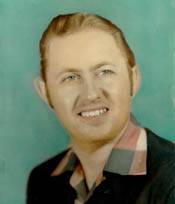 Jimmy Martin at 23 |
Martin
left MCA Records in 1974 and recorded for a number of independent
labels. His novelty songs Goin' Ape Over You and Skip, Hop and Wobble, also impacted. "If I'm singing a funny song, I want everyone to whoop and holler and dance," he explained in a 1999 interview. "And when I sing 'Shake Hands With Mother Again' or a good gospel song, I'm thinking of good things, thinking of heaven, someday we're all going to be there. And if I sing a sad song, I feel sadness in my mind, in my heart, and just like I could cry. But I can't cry and put on - it has to come out just right, you see." |
When Martin
was inducted into the International Bluegrass Music Hall of Honour in
1995, he accepted the award with characteristic tact.
"I don't know if I should say this or not," he said.
"I wanted to be up here a lot earlier. But looks like they run out
of anybody to give it to, and they decided to give it to me tonight."
In 1994 Bear Family Records released the most comprehensive single collection
of his work - the five-CD 146-song box set Jimmy Martin and the Sunny
Mountain Boys.
His childhood obsession with hunting racoons never faded.
So on Run Pete Run and Pete, The Best Coon Dog In The State
Of Tennessee, Martin celebrated his hound dogs by allowing Pete to
howl on the record.
Martin's funeral was held at Cornerstone Church in Madison, Tennessee.
Survivors include three sons, Lee Martin of Plantation, Florida, James
H. ''Timmy'' Martin of Fort Lauderdale, Florida and Ray Martin of Mt.
Juliet, Tennessee, daughter, Lisa S. Martin-Arnold of Hendersonville;
and three grandchildren.
http://www.braindumps.com/1z0-051.htm
http://www.test-king.com/exams/70-243.htm
http://www.simmons.edu/
http://actualtests.com/
http://www.certkiller.com/exam-70-331.htm
https://www.exin.com/